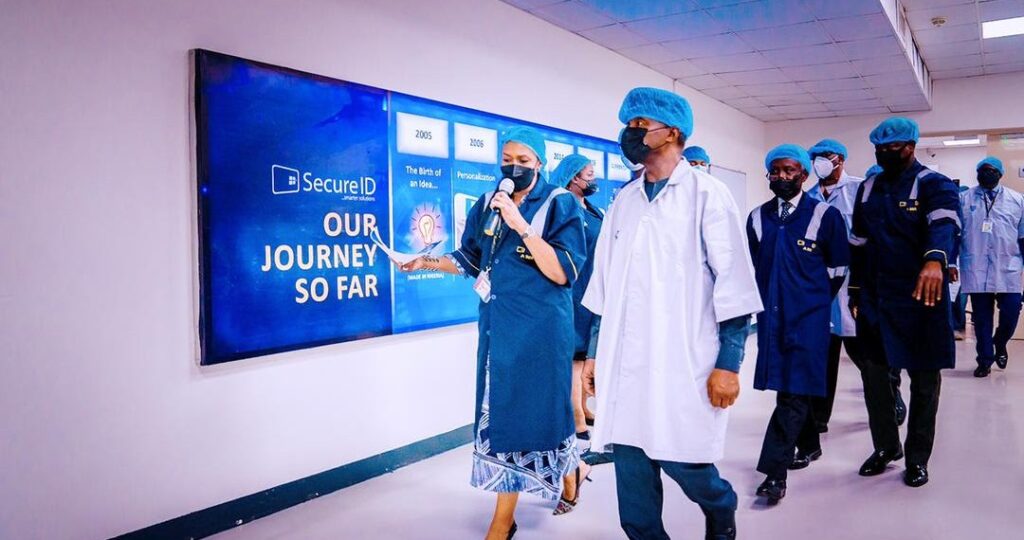It’s the first in sub-Saharan Africa and one of the three such cutting-edge facilities on the continent, with top prime global certifications for smart card manufacturing and it is based in Lagos, Vice President Yemi Osinbajo relished yesterday afternoon while touring SecureID company’s premises, and affirmed Nigeria’s extremely bright economic future, which he said cannot be aborted despite current challenges.
According to him, “the economic future of our nation is extremely bright. Yes, we have challenges today and they may look daunting. But let me assure you that these issues will be resolved. The march of this nation to its manifest destiny as Africa’s leading economic power will not be aborted. We are more than able to overcome.”
An impressed Osinbajo said the Buhari administration in “following the recommendation of the Presidential Economic Advisory Council, has determined that manufacturing will be our main focus in bringing about dynamic growth, jobs and exports. This will mean retooling our business environment for greater competitiveness, especially with the take-off of the African Continental Free Trade Area agreement.
“We are rethinking our tax regimes, sorting out external and internal trade issues, getting our regulatory authorities; SON, NAFDAC, and even Customs, to see their roles more as business facilitators rather than policemen or revenue generators. Our environment must be friendly for local businesses first, foreign investments will follow enthusiastically.”

Commenting on the efforts of the administration to position the country as a leading economic beacon on the continent, the VP also stated that the Buhari administration was ramping up efforts in improving the country’s infrastructure and digital space.
He said, “aside from the work we are doing with other infrastructure such as rail, roads and power we are committed to a plan of democratizing broadband connectivity. Our program, which we have reiterated in our Economic Sustainability Plan, is broadband connectivity for all by 2023.
“The Federal Ministry of Communications and Digital Economy launched the National Broadband Plan which is designed to deliver data download speeds across Nigeria of a minimum 25mbps in urban areas and 10mbps in rural areas, with effective coverage available to at least 90% of the population at affordable prices by the target date. Broadband connectivity is as important as electricity in the digital age, unlike electricity we do not have to make several mistakes before getting it right.”
While commending the efforts of the founder and Managing Director of SecureID, Kofo Akinkugbe, VP. Osinbajo described the SecureID facility as a place of history, innovation and creativity.
He said, “This world-class manufacturing facility is reputed to be the first certified smartcard manufacturing plant in sub-Saharan Africa, the only smart card production and personalization plant in West Africa and one of only six on the continent and one of only 80 in the world.
“The facility serves 21 countries across Africa and is fully certified by major commercial card companies – VISA, Verve and MasterCard. SecureID has shown that this country can be at the cutting edge of development in technology and digital enterprises. The world in which companies like SecureID operate, providing comprehensive end-to-end payment, identity management and digital security solutions is one that thrives on innovation.”
Continuing, the VP said, “the company has in these few years of her existence provided notable innovative offerings to the financial services sector, telecommunications, government, education, healthcare and private enterprises. Equally remarkable is the fact that with this facility, the company can produce all the payment cards, SIM cards, loyalty cards and the various identity management cards (residency cards, voter registration cards, drivers’ license and national identity cards) required here in Nigeria, with the capacity to spare.
“Congratulations also for your successes in getting the certifications that will help to meet the demands of customers, such as Global System of Mobile Applications (GSMA), Visa International, MasterCard Incorporated, Verve, Card Quality Management (CQM), and ISO 9001/2015 for Smart Card Manufacturing and Personalization of credit and debit cards.
“In particular, we must also congratulate SecureID for earning the GSMA certificate last year; this is a world-class security requirement for SIM card manufacturing and personalization. Your rapid expansion is also worthy of commendation, especially as you have added a number of subsidiaries, one of which is the digital arm of the business: SID Digital, while the other is involved in transport payment infrastructure. This has put the company in good stead to provide services ranging from identity management to tax collection, school management systems, health management systems, digital cards for the banks and, of course, e-ticketing for all forms of transportation, including road, rail and water.”
Speaking earlier at the event, the founder of SecureID, Kofo Akinkugbe, highlighted the significance of the Vice President’s visit, noting that the VP has come to see some of the much-touted potential being realized. She added that SecureID was a good entrepreneurial story of an abiding faith in God and the nation, proving the viability of investing and staying in the course.
Akinkugbe commended the federal government for establishing institutions and agencies to support and encourage start-ups, MSMEs and other enterprises that had offered assistance to the company.

The representative of the Governor of Lagos State, the Anglican Bishop of Lagos State, Humphrey Olumakaiye, alongside other top government functionaries, also attended the event.
Accompanying the Vice President was the Minister of State, Ministry of Foreign Affairs, Zubairu Dada; Deputy Chief of Staff to the President, Office of the Vice President, Ade Ipaye; and the Economic Adviser to the President, in the Office of the Vice President, Adeyemi Dipeolu.
Laolu Akande
Senior Special Assistant to the President, Media and Publicity
Office of the Vice President